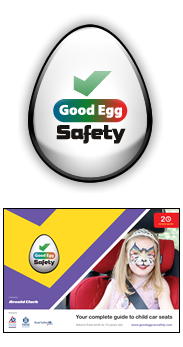Baby's Room

You can't be with your baby every hour of the day, so here is a simple checklist of the steps you can take to keep your baby safe in his or her room during the first few months.
- Always lay your baby on his or her back to sleep.
- Babies should sleep with their feet at the foot of the cot.
- Cover your baby with a sheet and light blanket, making sure the covers reach no higher than the baby's shoulders. Do not use pillows or duvets until your baby is at least 12 months old.
- Make sure your baby's mattress is firm and smooth, and that it fits snugly into the sides of the baby's cot, crib, carry-cot, pram or Moses basket.
- If using a cot, check that the bars are no more than 7.5cms (3ins) apart to avoid the risk of your baby's head getting trapped.
- Keep your baby's room at a comfortable temperature of around 18C (65F) as a young baby's body can easily overheat.
- Never use an electric blanket or hot water bottle, and make sure your baby never sleeps near a radiator.
- Choose simple clothes for your baby to sleep in. Avoid ribbons and loose weave cardigans as these can get hooked up and twisted around your baby's neck. Also, check for any loose buttons as these can easily be swallowed and cause choking.
- Never string a line of toys across your baby's cot or pram as the string could break and get wrapped around your baby's neck. Avoid giving your baby a toy with long hair or fur as these can cause choking. Remove all cot toys as soon as your baby can sit up or get up on all fours.
- If older brothers or sisters are around, make sure they never leave their toys in the baby's cot.
- Pets can get very jealous of a new arrival, so keep them out of your baby's room at all times.
- Always change nappies on the floor, never on a raised surface such as a table as it only takes a second for a wriggling baby to roll off.
- Once your baby becomes more active and tries to stand and climb, make sure the cot is not near a window as your baby could fall out or become tangled up in curtains or blind cords. Either shorten the cords or keep them tied up out of reach.
IMPORTANT NOTE: You can't see it, hear it, smell it or taste it yet carbon monoxide poisoning due to poorly maintained heating systems accounts for over 20 deaths and around 200 serious incidents every year. So fit a carbon monoxide detector and make sure your heating system is professionally serviced at least once a year.
Never smoke near your baby. Second hand smoke can have a serious effect on vulnerable young children, causing breathing difficulties which may also increase the risk of cot death. Always take your smoking break outside if you can, but bear in mind that the fumes from stale smoke on clothes can be just as harmful. So if you've always wanted to give up smoking, what better time to quit than now? Your local GP surgery may run stop smoking clinics, but you might prefer to make a start by visiting smokefree.nhs.uk or by calling the free helpline on 0800 022 4 332.






